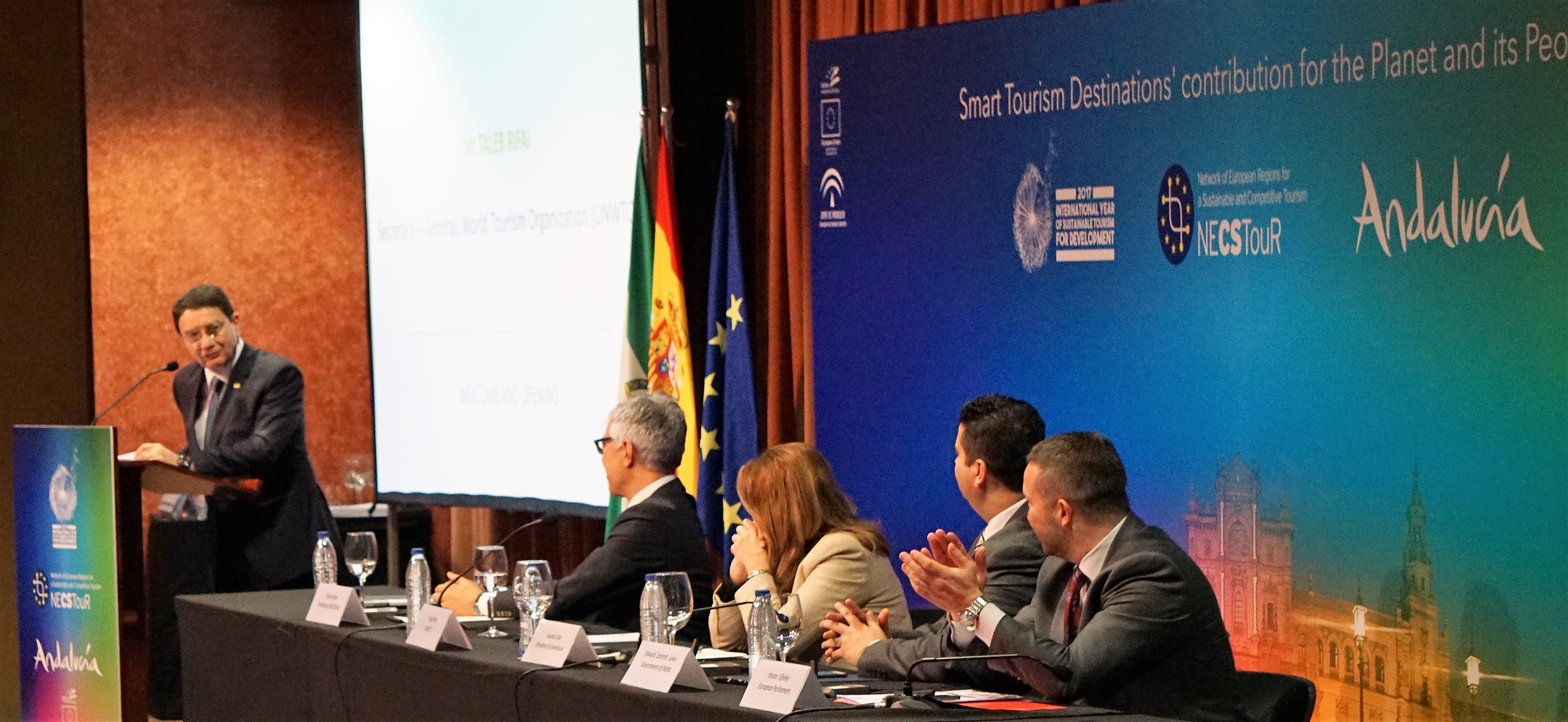
Thematic Conference: “Smart Tourism Destinations’ contribution for the Planet and its People”
-
12/04/2017
-
Members
The United Nations declared the 2017 as the International Year of Sustainable Tourism for Development (IYSTD), aiming to raise awareness on sustainable tourism as a catalyst for development, while contributing to the 17 Sustainable Development Goals (SDGs). This vision is at the core of the NECSTouR principles. In this regard, a ‘Memorandum of Understanding’ between NECSTouR and the UNWTO was formalized in December 2016, to foster collaboration between both organisations and jointly support the achievement of the IYSTD targets.
The thematic conference “Smart Tourism Destinations’ contribution for the Planet and its People” has been jointly organized in the framework of this cooperation. It took place on the 31st of March in Seville and it gathered 150 representatives from the European Regions and Member States, European Institutions, Universities and Research Centers as well as the Tourism sector stakeholders and international experts in sustainable tourism development.
The conference aimed at exploring the potential changes tourism can foster with regards to the different SDGs and to focus on the role and further actions that Smart Destinations play as drivers of change for a more sustainable tourism in the Region Europe.
THE SESSIONS
The event counted with the interventions of the Secretary General of the UNWTO, Mr. Taleb Rifai; the President of the Regional Government of Andalusia, Mrs. Susana Díaz; the Regional Minister for Tourism and Sports of the Regional Government of Andalusia, Mr. Francisco Javier Fernández Hernández; the Minister for Tourism of Malta, Mr. Edward Zammit Lewis; the Member of the European Parliament and Vice-Chair of the Committee of Transport and Tourism, Mr. Istvan Ujhelyi; and NECSTouR President, Director-General for Tourism of the Government of Catalonia, Mr. Octavi Bono.
All agreed on the power of tourism as a driver of positive change, through which European Regions can preserve, conserve and make alive their natural and cultural heritage, promote the sense of belonging and the European identity, foster innovation and SMEs competitiveness, as well as contribute to the World peace through the intercultural dialogue between the visitors and the community.
In view of the Oceans Conference, a first panel of discussions focused on “The Planet: Smart coastal and maritime tourism management – contribution to the SDG 14 implementation”. This panel took place to set up the bases of a EU Call for Action on “Blue Growth Tourism”. The regions of Västra Götaland and Andalusia showcased their experience with regards to the governance model for a sustainable maritime tourism and the measurement of the impact of the implemented blue growth policies. The European Environment Agency, the UNWTO Croatia Sustainable Tourism Observatory, CIVITAS Destinations and the Delegate of Europe-Latin America-Caribbean of Odyssea enriched the discussion, moderated by Mrs. Zoritsa Urosevic, Representative of the UNWTO at Geneva, by presenting different practices for supporting the conservation of seas and marine diversity, the reaching of the UN SDG 14 and the involvement of local stakeholders in the process of tourism development.
A session on the sustainable behaviour of regions was held as to reflect the critical role regions play with regards to the IYSTD dialogue and contributions of tourism to the SDGs.
The regions of Catalunya, Cornwall, Flanders, Galicia, Scotland and Tuscany presented how sustainability is embedded in their regional tourism policy and cooperate with the private sector to this end. The importance of EU Ecolabel, as well as the contribution of the ecolabels to the SDGs was presented by an official from the European Commission DG ENV while the Chief on Statistics of International Trade in Services Section United Nations Statistics Division introduced the measurability of the UN SDGs
Intercultural dialogue for tourism quality experiences was the topic explored during the last panel of the event. Andalusia and Île-De-France shared two good practises on the triangle tourism-culture-intercultural dialogue and undertook a discussion with the panellists on how these experiences could be capitalised among Europe through the 2018 European Year of Cultural Heritage.
Inspiring contribution to the discussion were provided by the panel moderator, Mr. Christof Kienel, head of Unit at the NAT Commission of the European Committee of the Regions, , the Member of the European Parliament Mrs. Claudia Tapardel who co-chairs the Intergroup “Tourism and Cultural Heritage”, Mrs. Anne Grady, Policy officer at the European Commission DG EAC unit in charge of the European Year of Cultural heritage 2018, Mrs. Ilona Lelonek, Policy Officer at DG GROW Tourism Unit, Mr. Jean Marc Mignon representing the World Committee on Tourism Ethics, Mr. Antonio Massieu, Chair of INRouTe who brought the importance of measurability of sustainable tourism at subnational level and Mr. Richard Eltvedt, Director of Governmental and Citizenship Affairs at Euro Disney, representing one of the European icons and how the private sector behaves in a sustainable way and contributes to intercultural dialogue
NEXT STEPS
During his conclusive remarks, Mr Taleb Rifai, Secretary General of UNWTO, underlined the importance for the European continent to become a reference for sustainable tourism in the world and insisted on the necessity of acting in an innovative way at this regard.
“The aim of NECSTouR – concluded Mr Octavi Bono, President of NECSToUR - is to support the development of a European model of sustainable tourism, while gathering regions having the same goals in supporting and promoting the development of competitive and sustainable European tourism. This is our goal and this is how we want to contribute for a better Europe and a better future of the citizens of the world”.
The Regional good practices presented as well as the proposed actions remain now as the main outcome of this conference, which is embed in the NECSTouR work programme 2017, enhancing synergies with both the IYSTD events and the broader cooperation with the UNWTO.